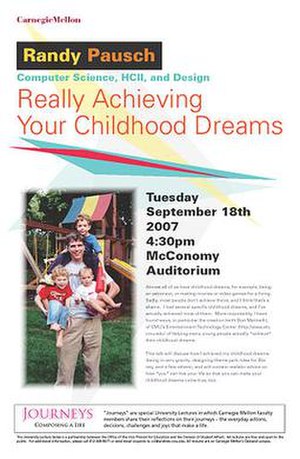 Image via WikipediaWhile I watched this video (Yay! I watched it in one sitting! Are you proud of me Dr. Strange?), I was taking notes and laughing. Dr. Randy Pausch epically encompassed how I want to live my life. He achieved his dreams and made lasting memories. His legacy is one of fun and excitement for learning. It is one of my dreams to leave a legacy at least half as fulfilling.
Image via WikipediaWhile I watched this video (Yay! I watched it in one sitting! Are you proud of me Dr. Strange?), I was taking notes and laughing. Dr. Randy Pausch epically encompassed how I want to live my life. He achieved his dreams and made lasting memories. His legacy is one of fun and excitement for learning. It is one of my dreams to leave a legacy at least half as fulfilling. Not only did he accomplish his own dreams, but he worked hard to help other people achieve their own dreams. He gave his students support, believed that people can surprise you, wanted to give others a chance to make other people excited and happy about something. He never set a bar of achievement in his classes, instead he left the goal open to expansion. That is a fundamental difference between adequate teachers and extraordinary teachers. Adequate teachers are satisfied by a certain result and don't push for anything more. Extraordinary teachers--like Dr. Pausch--are always asking the students to go beyond their expectations and to surprise them with the results. Sometimes you get something that you never dreamed was possible.
Pausch made the point that the main goal of teachers should be to make students self-reflective. I couldn't agree more or I'd be him. One of the most critical jobs of an English teacher--any teacher really--is to create within each student the desire and ability to look at their own work and see what is good about it and what needs to be improved. Once they figure that out and have a handle on it, your job as a teacher is so much easier. The self-reflective student is capable of not only taking your criticism and guidance and putting it to good use, but is also able to evaluate their own progress and take themselves to the next level. When that happens, you know that you've accomplished something of some worth. You've helped them to value their own input in life.
When you're screwing up and no one is bothering to tell you, it means they've given up.
That pretty much sums up the learning process. How can anyone expect to learn anything new if they are stuck in the old patterns and no one will tell them? They can't. It's as simple as that. You have to be willing to take the criticism and guidance before you can actually excel, but most importantly, someone has to also be willing to criticize you and give you that nudge in the right direction. Dr. Pausch delivered that point through lens of football, but since I'm more of a literary thinker, I related the principle to writing. When I was in high school I wasn't what one might call a "great" writer. I could write well enough, but what I produced was middle-grade material that I could count on to earn me a B or sometimes an A. Suddenly, I was in college and my Honors Composition 105 teacher challenged me to write in ways I had never considered before. I had to change my way of writing to do well, and what resulted was my rebirth as a writer. Dr. Becky McLaughlin was my nudge and she called me out on my limitations.
These days I can't get enough of writing. I write for The Vanguard, I write for class (most of my classes are writing intensive), and I write on my own for fun. Yes, for fun.
Experience is what you get when you didn't get what you wanted.
We're all going to have days where we feel like we've hit rock bottom and we couldn't get any lower, and then the next day comes and things get worse. We get humbled by these days because they remind us that we're not infallible. It is those times of defeat that we gain the experience we need to keep rising to the challenges we may face. Dr. Pausch lists a few ways to get people to help you. Word hard. Never complain. Apologize. Show gratitude. Look for the best in everyone. Be prepared. Be earnest. Tell the truth.
All of those things he listed are the traits of a great teacher. We can't afford to be stingy, lazy, whiny, proud, withdrawn, blind, liars. Those attributes don't make good teachers, and they certainly don't make a nice person.
But perhaps most importantly, we need to remember Dr. Pausch's overall message: Have fun!

Bailey,
ReplyDeleteI don't believe I've ever come across a blog, as well written as yours. Your analogy of Randy Pausch was very good. You covered all the main ideas and really seem to get into it. I think you are made of the right stuff and will be a great teacher. You know Bailey, one thing that really got me about Randy's lecture, was the head-fake thing. Randy really worked the audience. Everyone forgot about his illness, and was focused on the intensity, by which he was delivering the lecture. I thought it was nice at the end, when he praised his wife(with a birthday cake), and informed the audience, they had gone for the head fake, as the lecture was not meant for them, but for his
kids.
Hi, Bailey!
ReplyDeleteI must agree with Woodie - your blog is incredibly well written!
How Randy Pausch taught is just as important as how he led his life!
- Allie